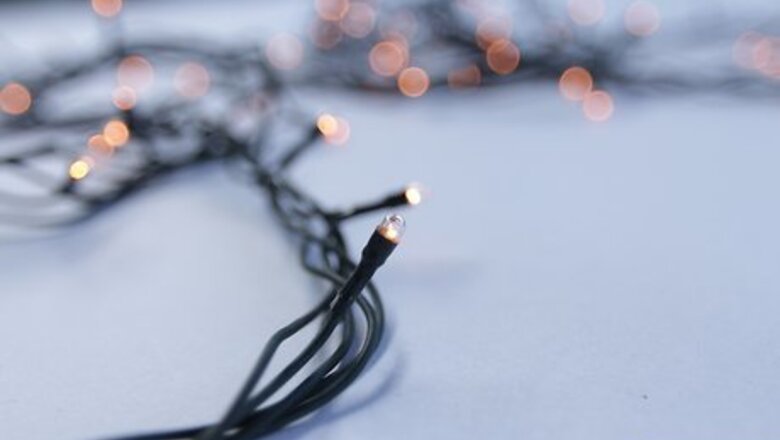
views
Selecting the Light Type
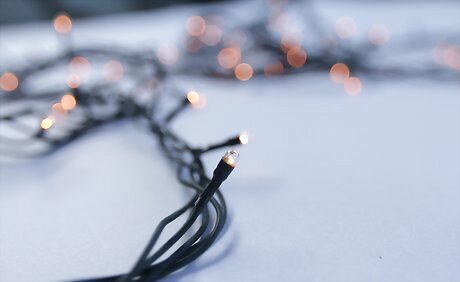
Go for miniature sized lights to avoid overwhelming your windows. Miniature lights will provide enough light to illuminate your windows without being too bright or too big. Miniature lights are often narrow and long in shape to provide a nice twinkle when they are turned on.
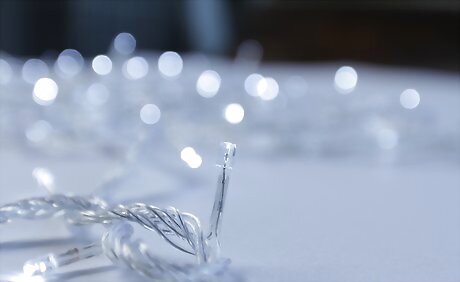
Try LED lights for a bright, blueish color. LED lights will have a blueish tint, especially if you go for white lights. They are also usually more durable and last longer than incandescent lights. LED lights may also be a better option if you only have 1 power source, as they are energy-efficient.
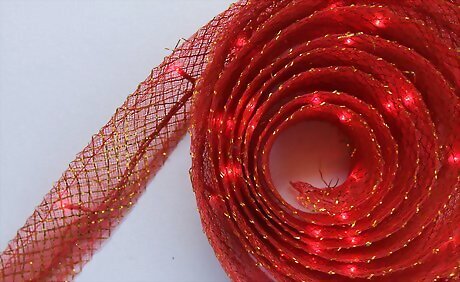
Go for incandescent lights for a warm, orange glow. Incandescent lights have bulbs that are slightly orange. These lights give off a warm twinkle when placed in windows, so they may be ideal if you prefer warmer looking lights. Keep in mind incandescent lights may not last as long as LED lights. You may need to replace incandescent lights more often, or each season, to keep them looking warm and bright.
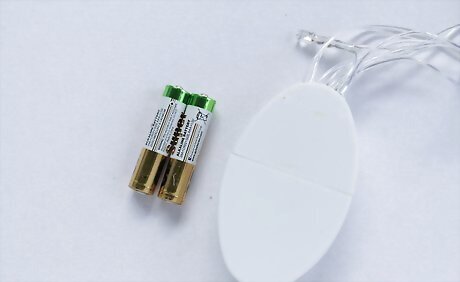
Get battery operated lights if you do not have a plug nearby. Battery operated lights are a great option for lights around windows and doors, as they do not require a power source. They often come in small strands made for wrapping around standard sized windows and have a small battery pack attached to them that you can hide behind a curtain or window sill. Look for battery operated lights at your local hardware store or online.
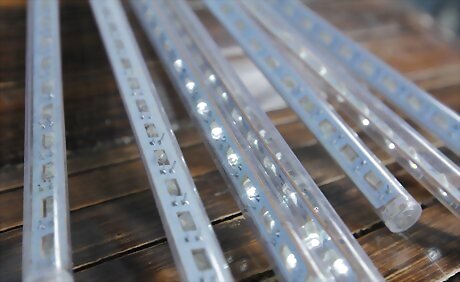
Pick white lights for a classic look. Go for white lights around your windows if you want a simple, clean look for your home. You may also opt for white lights if you are putting up colored lights in other spots on your home or in your yard.
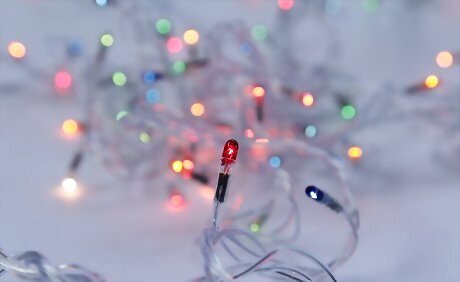
Opt for colored lights for a bold look. For an eye-catching look, go for multi-colored lights or lights in traditional Christmas colors like green and red. Try a strands of red, white, and blue lights for your windows for a fun holiday look. You may also use colored lights in the same color to give your windows a uniform look, such as all blue or all red lights.
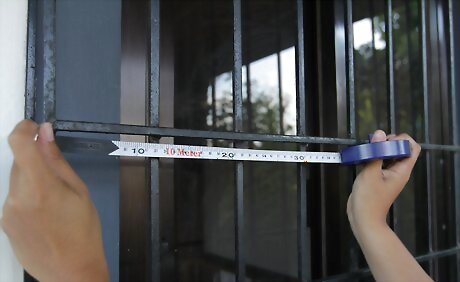
Measure the windows so you know how many strands and hooks you need. Use a measuring tape to measure the length around your windows to determine how long the christmas lights need to be. You may need to buy several strands or rolls of lights to line your windows, especially if you are putting lights around multiple windows. You should also factor in how many hooks you will need per window. Usually about 6-8 hooks per a window is a good estimate. Light hooks are important as they are specially made to keep the lights in place when you hang them. They are usually made of plastic and are white or transparent so they are less noticeable. You may want to tack on a few extra inches onto your measurements for the lights so you have more than enough. This can ensure you have the extra length needed to plug the lights into a power source.
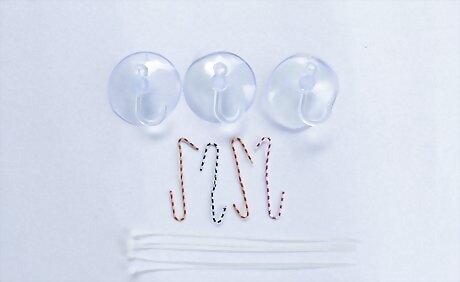
Buy the lights and hooks online or in stores. Christmas lights can range in price from $10-$20 USD for 50 to 100 lights per strand. Check online at holiday light retailers or in big box stores for Christmas lights that fit your budget and needs. Light hooks are often sold in bulk in large boxes of 50-100 at hardware stores or online. Go for hooks made to hold Christmas lights in place, as they will have slots large enough to fit the lights and ensure they stay secure. Adhesive hooks are a good option, because they don't require you to drill or nail anything.
Determining the Lighting Design
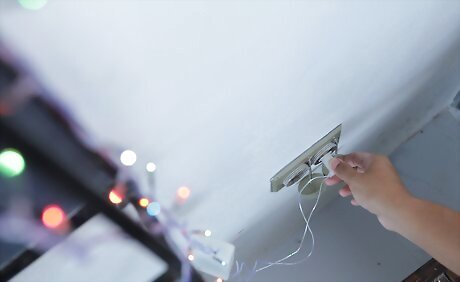
Put the lights up outside if you have access to an external power source. Make sure you have an external power source you can use to plug in the outdoor lights. Outdoor lights may also be ideal if you have lights that are durable and can withstand weather changes. You may also just prefer the look of outdoor lights on your home. If you are using battery operated lights for the windows, you do not need to worry about having access to an external power source.
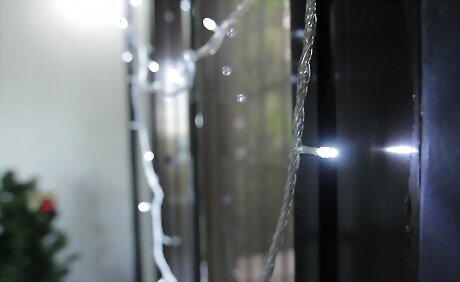
Hang lights on the inside of your windows for a low-maintenance option. Another option is to place Christmas lights on the inside of your windows so you do not have to worry about the bulbs being exposed to cold weather or the climate. Putting lights up indoors also means you can keep the bulbs clean and bright for the entire holiday season. Indoor lights may also be a good option if you do not have an external power source or want to use battery operated lights.
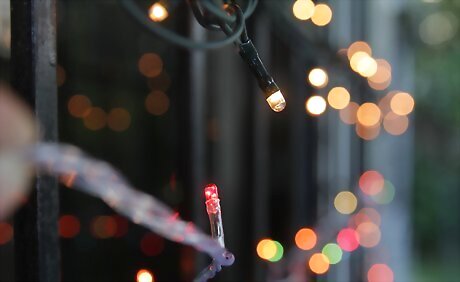
Put the same light type together for a uniform look. Do not mix LED and incandescent lights together, as the difference in the bulb color will create too much of a contrast. Instead, put the same type together so the lights look uniform and emit the same kind of light.
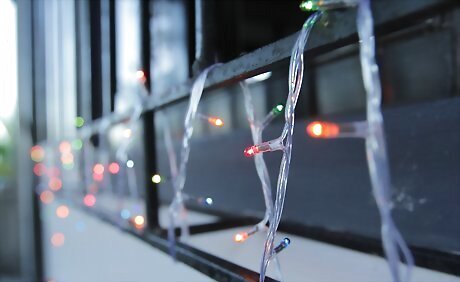
Mix and match different colored lights to form a pattern. Create a holiday pattern by putting up red and green lights on your windows, alternating between each color in each window. Or use white and blue lights in each window for a fun pattern. Multi-colored lights are also a good option if you’d prefer to keep the windows uniform but also festive.
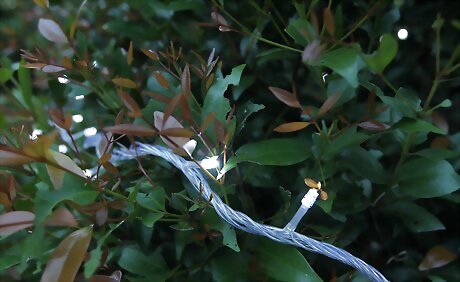
Factor in the other holiday decorations on your home. If you plan to put up Christmas lights in other areas in your home or on the outside of your home, think about how the window lights fit into the overall design. Make sure your window lights complement the other lights you are going to put up or other Christmas decorations you are using. For example, you may opt for window lights that are red if you plan to put up green lights on the railings and eaves of your home. Or you may go for multi-colored window lights if you are going to use white lights on the trees and bushes in your front yard.
Putting up the Lights
Test the lights before you put them up. Put the lights on the ground in your yard or your home and plug them into a power source. Make sure every bulb works on the strand and that there are no dull or broken bulbs.br> If you notice a dull or broken bulb, you can buy a replacement bulb or use a strand with no broken bulbs instead. You can also return the strand with the dull or broken bulb and ask for a replacement strand, especially if you purchased the lights recently.
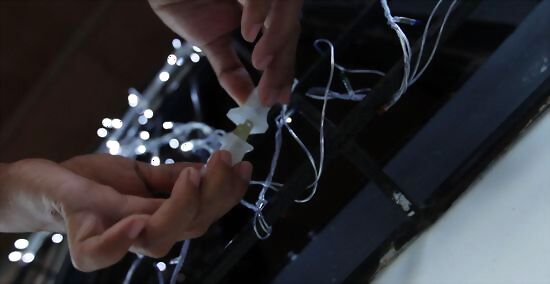
Connect strands of lights together so they fit around the windows. Using your measurements for your windows, attach the strands to each other via a plug at the end of each strand. Make sure the lights are all facing the same direction when you attach them together so they look uniform.
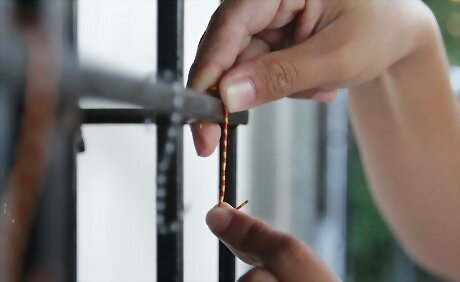
Put the light hooks 2 to 3 inches (5.1 to 7.6 cm) apart around the windows. The hooks will have an adhesive on one side that you can attach to the outside or inside of your windows so the hooks stay in place. This will save you the trouble of using screws or nails to put up the lights, which can damage your windows. Use at least 6-8 hooks per window, 1 in each corner and 1-2 on each side of the window so the lights can hang properly.
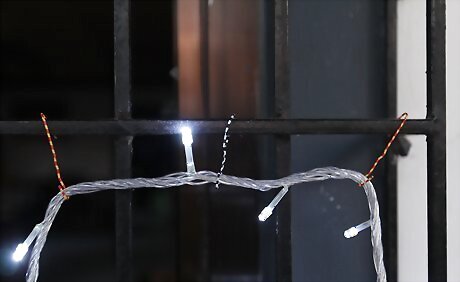
Hang the lights on the hooks, spacing them evenly apart. Begin at the highest point on the window and work your way down. Slide the bulbs into the notch on the hooks. Make sure the lights are all facing the same direction and they sit flush against the window. Use a ladder to hang lights on high windows. Make sure the ladder is stable and safe to use. If you can, get someone hold the ladder for you to steady it.
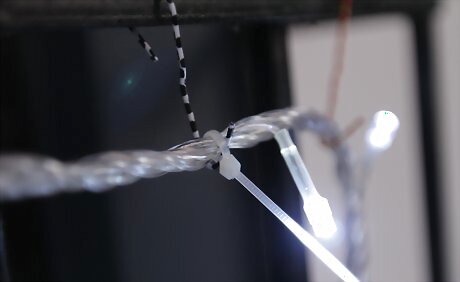
Secure the lights to the hooks with transparent tape or plastic cable ties. Use small pieces of transparent tape around the bottom of the bulbs to secure them to the hooks. You can also look plastic cable ties around the bulb and the hook to keep the lights in place. Look for transparent tape and cable ties at your local hardware store or online.
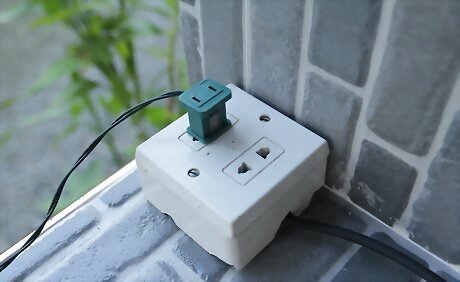
Plug the lights into a power source, if needed. If you are not using battery operated lights, you will need to plug them into a power source. If the plug on the light is not long enough to reach a power source, run an extension cord from the lights to a nearby power source. Use electrical tape to cover the extension cord and secure it against your home so it is not in the way. Then, plug in the lights and enjoy the festive look of your windows.













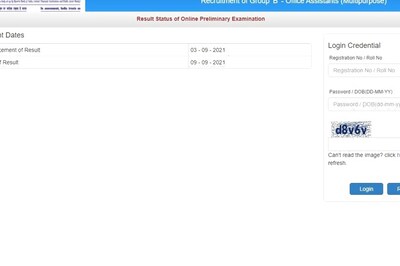






Comments
0 comment